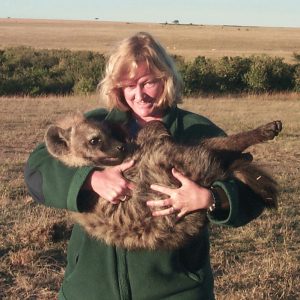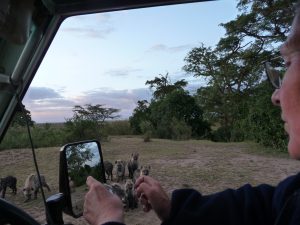

The hyena watcher — Dr Kay Holekamp
A Smith College alumna, with a PhD from University of California, Berkeley, Dr. Kay Holekamp has studied hyenas in Kenya since early 1988. As a result of her work we now have a much improved understanding of hyena biology in particular female reproduction and behavior. Her research focus is the social and hormonal aspects of group dynamics in both spotted and striped hyenas. Despite she has also made substantial contributions through her work on other mammals. Indeed, despite her current reputation as the worlds expert on hyena biology her early work was rodent-centric where in addition to examining sex-specific natal dispersal she also worked extensively on the topic of sexual size dimorphism. Her dissertation on the proximal mechanisms of natal dispersal in Beldings ground squirrels produced a series of papers examining dispersal in ground squirrels. In these she showed that males disperse much earlier than females, probably when they reach a certain body mass (the proximate ‘cue’ for dispersal). The ultimate explanations for sex-biased may lie in avoiding familial incest or increasing access to mates. She also worked to understand the hormonal profiles of free-living ground squirrels when she addressed interesting questions such as: what is the role of prolactin particularly in free-living animals and What is the typical seasonal variation in hormones in such animals?
Her research interests shifted to maternal rank and this appears to coincide with her interest on hyenas (in particular spotted hyenas). In an early paper she demonstrated that in many mammals with maternal rank inheritance, both kin and non-kin coalitions may form to help juveniles secure their ranks. Other early hyena publications focused on provisioning and lactation in hyenas and illustrated that provisioning is minimal at dens.
Her focus gradually shifted to an interest in maternal rank itself with a focus on the hyenas for which Holekamp’s research is best known. Using long-term data on spotted hyenas (Crocuta crocuta) from her field sites in Kenya, she documented the enormous reproductive benefits to high-ranked females (e.g. more surviving offspring, earlier age at first reproduction relative to low-ranking females). Her work now often includes work on striped as well as spotted hyena biology (in particular behavioral endocrinology).
More recently, her research on the group dynamics of hyenas has allowed Dr. Holekamp to address questions relating to the evolution of mammalian intelligence. In recent comparative studies of Carnivora she demonstrated that brain-size may correlate with attempts at solving ‘puzzle boxes’ but not necessarily the ability to solve them. Her talk at the 2020 SICB symposium Reproduction: the female perspective from an integrative and comparative framework is entitled ‘Social competition affects reproductive decisions made by female spotted hyenas’.
Dr. Holekamp is C. Hart Merriam Award winner from the American Society of Mammalogists, a fellow of the Animal Behaviour Soceity, and in 2012 Dr. Holekamp was admitted to the American Association for the Advancement of the Sciences.